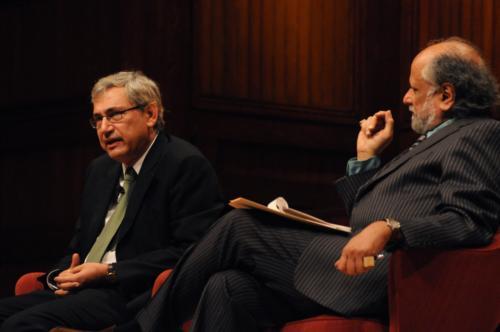
News
Harvard Lampoon Claims The Crimson Endorsed Trump at Pennsylvania Rally

News
Mass. DCR to Begin $1.5 Million Safety Upgrades to Memorial Drive Monday

Sports
Harvard Football Topples No. 16/21 UNH in Bounce-Back Win

Sports
After Tough Loss at Brown, Harvard Football Looks to Keep Ivy Title Hopes Alive

News
Harvard’s Greenhouse Gas Emissions Increased by 2.3 Percentage Points in 2023
Nobelist Recalls Naive Days
Turkish author speaks about the 'sentimentality' of writing novels

Novelist Orhan Pamuk, a Nobel laureate, said in a lecture yesterday that he was once a naïve young man who read while lounging beside a stinking ashtray at home in 1970s Istanbul.
During his first Norton Lecture, Pamuk said that unlike Harvard students, he taught himself. He plunged into bildungsromans like Gustave Flaubert’s “Sentimental Education,” looking for action and conflict and the meaning of life, “not bothered at all about the artificial act of reading and writing a novel.” Over time, the wisdom in the bildungsroman shaped his soul and he grew reflective and unsettled, as a driver becomes conscious of his machine, he said.
Pamuk spoke cheerfully, dressed conservatively in black and white, his enthusiasm and sincerity brimming over his careful enunciation as he painted metaphorical landscapes and read excitedly from his favorite novels.
Now, after 35 years of writing novels, Pamuk told an audience in Sanders Theater that “being a novelist is the art of...being both naïve and sentimental.” Pamuk said that he was using the word sentimental in its particular German sense—reflective—which he came to admire by reading Friedrich Schiller’s “On Naïve and Sentimental Poetry,” an inspiration for his current lectures, called “The Naïve and the Sentimental Novelist.”
The Charles Eliot Norton Lectures have been a Harvard tradition since 1926, and are now hosted by the Humanities Center. As he delivers the five remaining lectures, Pamuk will spend time on campus, and will even hold office hours, according to Director of the Humanities Center and Professor Homi K. Bhabha. All the lectures are held at 4 p.m. in Sanders Theater, and are free and open to the public. The next lecture will be September 29, and the final lecture will be delivered on November 3.
Pamuk won the Nobel Prize in 2006. He has lived for many years in Istanbul, and is now a professor at Columbia University, where he teaches comparative literature and writing. His books have sold over seven million copies, and his statements on politics have generated much controversy, especially in Turkey.
In future lectures, Pamuk said he will return to Schiller, as well as examine various aspects of the novel. “Each sentence of a good novel evokes in us a sense of real, great knowledge of what it means to exists in this world,” he said, calling the process a search for a center. “In these talks, we will investigate how a novel can bear all this weight.”
—Staff writer Alex M. McLeese can be reached amcleese@fas.harvard.edu.
Want to keep up with breaking news? Subscribe to our email newsletter.
